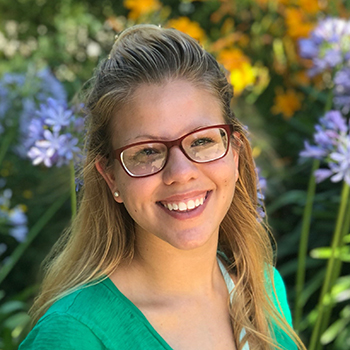 CONWAY, Ark. (March
18, 2021) — Hendrix College student Savannah Wiegel ’21, a biochemistry/molecular
biology major from London, Arkansas, has been announced as a member of the 53rd
class of Thomas J. Watson Fellows.
CONWAY, Ark. (March
18, 2021) — Hendrix College student Savannah Wiegel ’21, a biochemistry/molecular
biology major from London, Arkansas, has been announced as a member of the 53rd
class of Thomas J. Watson Fellows.
The Watson Fellowship
is a one-year grant for purposeful, independent study outside the United
States, awarded to graduating seniors nominated by one of 41 partner colleges.
Wiegel is the 38th
Hendrix student to receive a Watson Fellowship. (See
the full list)
Wiegel’s project,
“Healing Words: Building Community Health through Narrative Medicine” will take
her to Ireland, Switzerland, Japan, Guatemala, and Argentina, where she will
explore the intersection of storytelling and medicine to inform public health
initiatives.
“I would like to
build stronger, sustainable systems of community health that promote personal,
empowering conversations about health of the mind and body, and I want to thank
the Watson Foundation for their support in pursuing my dream,” she said. “And
I’m so thankful for my friends, professors, and peers who supported me throughout
my four years at Hendrix and during this application process.”
Wiegel became
interested in the Watson Fellowship during her very first Odyssey project at
Hendrix, which also was one of her first exposures to public health. She heard
about the Watson Fellowship from Hendrix nominee Kaersti McLellan ’19, while
they both participated in the group Odyssey project “Exploring Aspects of the
Nicaraguan Healthcare System.” Their experience included traveling to Nicaragua
to learn about how kidney transplants are conducted there. “Being in that
global setting helped me realize my dream to become a Watson Fellow,” she said.
Since that time, Wiegel
says her involvement with the Narrative Medicine group on campus, her pursuits
as a Murphy Scholar in Literature and Language, Spanish classes and
Spanish-speaking Odyssey opportunities, and the investment in science
communication opportunities at Hendrix helped her bring her Watson Fellowship
project proposal to life.
When Wiegel’s
interest in narrative medicine began, she viewed it primarily on the individual
level: the importance of telling and understanding experiences and emotions
shared in one-on-one patient interactions. “It wasn’t until halfway through my
junior year that I saw the potential narrative could have in public health,
especially in the context of a pandemic,” she said. “I knew I wanted to find a
way to intertwine my passions for narrative medicine, science communication,
and public health, and I’m so honored to be able to pursue my dream in a global
context.”
As a medical
translation intern and aspiring health professional, Wiegel has witnessed how
misunderstandings, health inaccessibility, and moral fatigue create
deficiencies in healthcare provided to communities.
“The medical
experience is believed to exist within the hospital walls, but there is so much
left unspoken and even more left untreated,” she said. “Narratives empower
individuals and give agency to communities to understand illness, suffering,
and humanity, and I hope to discover new ways to incorporate narrative in
community health on my Watson journey.”
“Savannah built
upon her experiences in the Odyssey and Murphy Scholars programs to create an
extraordinary proposal for world travel,” said Bailey Library Director Britt
Anne Murphy, who serves as the College’s Watson liaison. “Her persistence in
reaching out to international partners in a pandemic was critical to the
success of her proposal. Indeed, her passion for narrative medicine is needed now
more than ever to provide healthy channels of communication between health
professionals and their patients.”
Wiegel’s time at
Hendrix has included multiple experiential learning opportunities. To name just
a few, she has spent two years leading the Narrative Medicine group as part of
her Murphy Scholar activities; co-coordinated a financial literacy forum
through the Arkansas Geriatric Education collaborative, also funded by UAMS; volunteered
with Arkansas Hospice (pre-pandemic) through the Odyssey Program; performed summer
research in genetics guided by Hendrix Professor Dr. Andrea Duina; and
currently participates in a National Institutes of Health-funded translational
research collaboration between Hendrix and the University of Arkansas for
Medical Sciences. Beyond medicine and science, she has learned about the
Spanish Civil War and Spanish exile literature with the support of the Odyssey Program
and the Hendrix-Murphy Foundation, studied abroad through the Hendrix-in-Madrid
program, and spent three years mentoring first-year students through the Explorations:
Liberal Arts for Life common course.
“Our candidates
this year – Savannah, Brittany Chue, Peyton Hall, and Mallory Magruder – worked
together closely, even though most of it was on a virtual platform,” said
Murphy. “They all are to be celebrated for pulling together excellent proposals
during a year when more than the usual obstacles were thrown at them.”
Murphy said that similar
to last year, the ongoing coronavirus pandemic will be taken into account as
the new Watson Fellows plan their travels. “While the Watson Foundation is
hopeful that most Fellows can begin their journeys by August 1, they continue
to be flexible about deferring journeys until the world is safe enough to allow
for the international stays Watson Fellows require.”
About Hendrix College
A private liberal
arts college in Conway, Arkansas, Hendrix College consistently earns
recognition as one of the country’s leading liberal arts institutions, and is
featured in Colleges That Change Lives: 40 Schools That Will Change
the Way You Think About Colleges.
Its academic quality and rigor, innovation, and value have established Hendrix
as a fixture in numerous college guides, lists, and rankings. Founded in 1876,
Hendrix has been affiliated with the United Methodist Church since 1884. To
learn more, visit www.hendrix.edu.